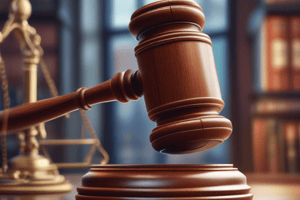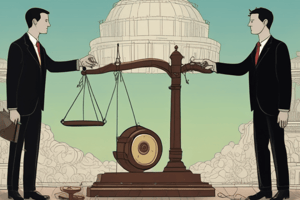Podcast
Questions and Answers
Which scenario exemplifies a sophisticated client effectively utilizing legal counsel?
Which scenario exemplifies a sophisticated client effectively utilizing legal counsel?
- Providing the lawyer with detailed and accurate information while also researching basic legal principles relevant to their case. (correct)
- Relying solely on the lawyer's advice without conducting independent research to expedite the legal process.
- Withholding potentially damaging information from the lawyer to maintain a stronger negotiating position.
- Pressuring the lawyer to pursue a legal strategy based on personal feelings.
A business owner is launching an innovative tech startup. In which of the following situations is consulting a lawyer MOST crucial?
A business owner is launching an innovative tech startup. In which of the following situations is consulting a lawyer MOST crucial?
- Scheduling routine maintenance for office equipment.
- Negotiating a lease for office space and securing intellectual property rights for their software. (correct)
- Ordering business cards with standard contact information.
- Deciding on the color scheme for the company logo.
A client insists their lawyer pursue a specific legal strategy, despite the lawyer's advice that it has a low chance of success. Which statement BEST describes the lawyer's ethical obligation?
A client insists their lawyer pursue a specific legal strategy, despite the lawyer's advice that it has a low chance of success. Which statement BEST describes the lawyer's ethical obligation?
- The lawyer should withdraw from the case if the client's instructions are unreasonable or unethical.
- The lawyer must follow the client's instructions without question, as the client is ultimately in charge.
- The lawyer is obligated to disregard the client's instructions and act in what they believe is the client's best legal interest.
- The lawyer should attempt to persuade the client to reconsider but must ultimately follow the client's instructions if they persist. (correct)
When selecting a lawyer, what is the MOST important consideration after determining the lawyer's expertise in the relevant field of law?
When selecting a lawyer, what is the MOST important consideration after determining the lawyer's expertise in the relevant field of law?
What is a key difference between a 'fixed fee' arrangement and an 'hourly rate' arrangement when retaining a lawyer?
What is a key difference between a 'fixed fee' arrangement and an 'hourly rate' arrangement when retaining a lawyer?
In which of the following scenarios would a lawyer MOST likely agree to a contingency fee arrangement?
In which of the following scenarios would a lawyer MOST likely agree to a contingency fee arrangement?
A client is considering representing themselves in a legal dispute. What factor should weigh MOST heavily on their decision?
A client is considering representing themselves in a legal dispute. What factor should weigh MOST heavily on their decision?
Which of the following services Legal Aid Alberta MOST likely provide to an eligible client?
Which of the following services Legal Aid Alberta MOST likely provide to an eligible client?
A client has paid their lawyer a retainer. Under what circumstances is the lawyer ethically and legally obligated to return a portion of these funds?
A client has paid their lawyer a retainer. Under what circumstances is the lawyer ethically and legally obligated to return a portion of these funds?
What constitutes misappropriation of funds by a lawyer regarding a client's retainer?
What constitutes misappropriation of funds by a lawyer regarding a client's retainer?
A client believes their lawyer has acted unethically. Which action would NOT be a valid basis for filing a formal complaint with the Law Society of Alberta?
A client believes their lawyer has acted unethically. Which action would NOT be a valid basis for filing a formal complaint with the Law Society of Alberta?
If a client feels overbilled by their lawyer, what is the appropriate initial step they should take to dispute the fees?
If a client feels overbilled by their lawyer, what is the appropriate initial step they should take to dispute the fees?
A lawyer is found to have stolen funds from a client's trust account. Besides potential criminal charges and disbarment, what recourse is available to the client for compensation?
A lawyer is found to have stolen funds from a client's trust account. Besides potential criminal charges and disbarment, what recourse is available to the client for compensation?
Which element is LEAST likely to appear in a code of conduct for a small business?
Which element is LEAST likely to appear in a code of conduct for a small business?
In a legal context, what is the most significant characteristic of 'precedent'?
In a legal context, what is the most significant characteristic of 'precedent'?
A prior court case established that businesses are not liable for injuries sustained by trespassers on their property unless gross negligence is proven. If a very similar case arises, how is the judge most likely to rule, based on the principle of precedent?
A prior court case established that businesses are not liable for injuries sustained by trespassers on their property unless gross negligence is proven. If a very similar case arises, how is the judge most likely to rule, based on the principle of precedent?
Flashcards
Sophisticated client
Sophisticated client
Knowledgeable in basic law, confident with lawyers, researches law, provides accurate info, understands advice.
When to consult a lawyer
When to consult a lawyer
Incorporating, buying copyrights/patents, property matters, privacy, franchising, hiring, cybersecurity, financing, contracts, tax, A/R.
Role of a lawyer
Role of a lawyer
Advice, options, rights, and potential consequences. May offer opinions on case strength/success.
Role of a client
Role of a client
Signup and view all the flashcards
Selecting a Lawyer
Selecting a Lawyer
Signup and view all the flashcards
Legal Aid Eligibility
Legal Aid Eligibility
Signup and view all the flashcards
Fixed Fees
Fixed Fees
Signup and view all the flashcards
Contingency Fees
Contingency Fees
Signup and view all the flashcards
Disbursements
Disbursements
Signup and view all the flashcards
Retainer
Retainer
Signup and view all the flashcards
Legal Way to Withdraw Retainer Funds
Legal Way to Withdraw Retainer Funds
Signup and view all the flashcards
Grounds for Lawyer Complaint
Grounds for Lawyer Complaint
Signup and view all the flashcards
Consequences of Breaching Conduct
Consequences of Breaching Conduct
Signup and view all the flashcards
Disputing Lawyer Fees
Disputing Lawyer Fees
Signup and view all the flashcards
Code of Conduct for Business
Code of Conduct for Business
Signup and view all the flashcards
Law Based on Precedent
Law Based on Precedent
Signup and view all the flashcards
Study Notes
Characteristics of a Sophisticated Client
- Knowledgeable in the basics of law
- Confident in dealing with lawyers through meetings, talks, questions, etc.
- Able to research the law and find answers to basic legal questions independently
- Able to better assist the lawyer by providing complete and accurate information
- Able to understand advice from a lawyer
Reasons to Consult a Lawyer in a Business
- Incorporating the business
- Buying copyrights or patents
- Buying or renting properties
- Protecting privacy rights
- Franchising
- Hiring employees and managing employee rights
- Cybersecurity rights
- Financing
- Contracts
- Tax matters
- Accounts receivable
Role of a Lawyer
- Gives advice and options
- Informs clients of their rights and potential consequences
- Provides opinions on the strength and likelihood of success of a case
- A lawyer must follow the client's instructions
Role of a Client
- The client is in charge
- They must make informed decisions
- It is important to hire a lawyer for serious matters, actions in CQB, criminal law matters, or anything you don't understand
- Know your limitations
Representing Yourself
- Representing yourself is possible in small claims without a lawyer
Selecting a Lawyer
- Consider being honest about the case
- Try to book an initial consultation online or through a referral if available
- Meet with numerous lawyers
- Select a lawyer with experience in the relevant field of law
- Do not base your decision solely on fees
- A more experienced lawyer means a more expensive lawyer
Legal Aid
- An option based on eligibility which is usually substantive and based on financial eligibility
- It typically deals with cases in criminal, family, and child welfare law
- Applicants must have no job
Lawyer Fees
- Fixed fees are regardless of time involved, a flat rate, prepping for example
- Contingency fees are where the lawyer receives a percentage of the amount if the client wins the case and collects a settlement like personal injury
- Hourly rates refers to the amount billed to clients according to time spent
- Percentage rates refers to clients paying a fixed fee plus a based on value which is added
Other Fees
- Disbursements are out-of-pocket expenses the lawyer incurs while handling the case
- A retainer os an amount of money a lawyer requests before commencing work
- The retainer is held in trust for the client and is only legally taken out via working and invoicing the client
Complaints
- It is not possible to complain if a lawyer has done something to breach the code of conduct
- Complaints can be filed to the Law Society of Alberta for misappropriation of funds or ghosting you etc.
Process of Complaints
- Breach of codes can lead to fines, suspension, and disbarment
- A client can have a lawyer's bill reviewed for fair charges by a court official
- If the lawyer was negligent, a client can sue for compensation or make a claim to the insurer who provides liability insurance
- A client can make a claim to an assurance fund for compensation if a lawyer stole funds
Code of Conduct for Small Business
- Standards for employee behavior
- Use of corporate money and assets
- Confidentiality of business and employee information
- Fair dealing
- Conflicts of interest
- A process for reporting illegal and ethical behavior
Sources of Law
- Sources of law derive from judicial decisions and judgments of the court
- Past events set the standards for future cases where fairness, consistency, and predictability all matter
Common Law
- Traditional English law
- Supreme Court of Canada (SCC)
- Provincial Courts of Appeal (ABCA) deals with appeals of decisions
- Provincial Superior Courts (ABKB) handle complex cases with higher monetary value
- Alberta Court of Justice (ABCJ) represents the lower-level court
- Administrative tribunals hold hearings and make decisions but aren't courts such as labour relations and worker's compensation boards
Definition of Law
- The body of rules made by parliament, legislatures, government agencies, and courts that has binding legal force
Kinds of Law
- Statute law: Formal written enactment of a legislative body regulating behaviour and setting limits on conduct
- Common law: A body of law deriving from judicial decisions
- Substantive law are rules that govern behaviour and set limits on conduct
- Procedural law: Enforcement of rights and obligations
- Public law: Regulates the connection between the government
- Private law: Regulates personal, social, and business relationships
Constitution
- The Constitution Act of 1867 made Canada a country with independence and government set up
- Sections 91 and 92 list powers of federal and provincial governments
- The Constitution Act of 1982 contains the Canadian Charter of Rights and Freedoms
- It details how to amend the constitution requiring the consent of ⅔ of provinces containing 50% of the population
Court Decisions
- The constitution includes case law on constitutional issues, and laws can be struck down if deemed ultra vires
- The federal system consists of 11 bodies that consist of federal and provincial powers
- Federal systems also have control over emergency situations
Charter of Rights
- The Canadian Charter of Rights and Freedom in 1982 which protects certain rights from governmental interference
- Prior to 1982, the Canadian Bill of Rights of 1960 which no longer exists
- Charter rights as of 1982, are entrenched in the constitution
Rights and Freedoms include
- Guarantee of rights and freedoms that are not absolute, and that are guaranteed but subject to reasonable limits
- Fundamental freedoms of conscience, religion, thought, belief, expression, opinion, peaceful assembly, and association
- Democratic rights such as the right to vote and hold office.
Canadian Human Rights
- Protects individual rights in the private sector and applies to federally regulated sectors like banks and the military
- The Alberta Human Rights Act applies to all sectors not federally regulated, and most issues are dealt with through that commission
- Primacy legislation protects Albertans against discrimination in protected areas on certain grounds
- Protected areas involve publications, notices, ads, goods, services, facilities, publications, notices, adds, goods, services facilities etc, with the summary of prohibited grounds ranging through race, gender, religion and more
Studying That Suits You
Use AI to generate personalized quizzes and flashcards to suit your learning preferences.
Related Documents
Description
Explore the characteristics of sophisticated clients and their interactions with lawyers. Understand when businesses should consult lawyers for incorporating, property, or employment matters. Learn about the roles of both lawyers and clients in legal processes and decision-making.




